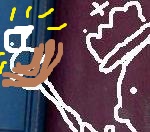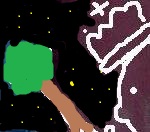Full Disclosure: None. New poet. Copy purchased with help from Patreon funders.

Review: On the surface, Odelola’s pamphlet is structurally straightforward. There are four named poems, in order: ‘Those McDonald’s Boys’, ‘Lost’, ‘Found’, ‘The Boys Outside McDonald’s’; the middle poems are both nine-part sequences, a series of short, complex, interconnected scenes. The book’s mirrored structure asks the reader to hold two poems in mind at once, to draw connections between one idea and another. The implication, from a structural level, is that these poems are interested in building a conversation that can sustain ambiguity and plural perspectives. Odelola is a software programmer, and self-published her first collection, #000000, online; there’s something Twine-y about the ‘Lost’ and ‘Found’ sequences, the way corresponding poems demand a level of non-linear reading, imaginative agility.
Lost & Found seems driven by a deep understanding of life in contemporary Brixton (explicitly the parts that remain ungentrified), a desire to convey its complications without simplifying or softening in the name of reader comfort. Significantly, its top priority seems to be Brixton’s own citizens; in British poetry there remains an assumed white middle class readership, and Lost & Found works hard to push away from it. The opening poem acknowledges a tendency among this cultural majority to dismiss ‘Those McDonald’s boys’ as violent or aggressive, to consider their incarceration (‘his reflection / In the bars keys rattle against’, the ‘comforting sound of sirens / Only shout when a brother is down’), as something inescapable or inherently justifiable. Odelola makes their immediate circumstances absolutely clear:
‘This is a war they were born into,
Their mothers had to fight in,
Their fathers had to love in.’
The poem moves from surface appearances, the arm’s-length ‘those boys’ in the first stanza:
‘With their black coats
And their black trousers,
And their black Air Force Ones’
to the internal, inclusive, immediate ‘these boys’ in the last:
‘With their black hearts,
And their black souls,
And their red blood,
And their red blood,
And their red blood,
Are at attention.
Fists clenched so tight
The life in them can’t be snatched at will.’
‘Those McDonald’s Boys’ makes a shape that repeats through the book, a movement towards care, compassion and empathy. Odelola’s tone is uncompromising and unsentimental, providing the young men’s experiences with a context spacious enough to make sense of their responses. The disapproving sniffiness of the poem’s title gives way to (though remains a vital self-sustaining function of) a larger society that leaves them with little more than the understanding ‘That everything / Has been taken / From them. / So they try to reclaim / This piece of pavement as their own.’ Note that if the poem does not judge these young men, it doesn’t defend them either; their actions are not framed as one side of a clear-cut moral binary but as an extension of a culture that has a far greater capacity for systemic violence than a handful of dispossessed individuals. That Odelola tells this story with such suggestive precision and imaginative economy is kind of stunning.
The corresponding piece that closes the book, ‘The Boys Outside McDonald’s’, builds on this work, expanding the poem’s world to include Brixton history (‘pre hipster invasion’, as per the book’s dedication), the Windrush generation, Electric Avenue, the work of 20th/21st century black poets:
‘you can read the way
Zephaniah has placed you on thrones,
Or how Nichols has painted you the colour
Of love, leaving you no choice but to
Smile when you look in mirrors.’
These poems not only counter a harmful cultural perception of young black men with insight and dignity, it also opens a world of experience and self-definition beyond an immediate, geographically and conceptually bound dispossession; the poem and book conclude, significantly I think, focused on community and networks of support:
‘Pass through the market and talk to the man
Who sells meat in the first stall from the main road.
He knows your mum, she talks about you to him […]
He knows she’s praying for you,
He knows you don’t care for God
He’ll tell you that she loves you,
Because he knows sometimes you’re not sure.’
The gesture is complicated and nuanced – the poet talks about the meat seller talking about his mother talking about him – the poem’s addressee is imaginatively surrounded with love and acceptance, and seems to be invited into a state of productive uncertainty, capacity for change, to ‘Remember that your feet were meant to move’.
The ‘Lost’ and ‘Found’ sequences give space for Odelola to expand this act of witnessing, adding another series of stories into the book’s remit. Talking about the poems requires a slightly askew reading, taking in two corresponding sections at once. In section ‘#2’ (and I suddenly notice that hashtag symbol, and can’t help reading it as the social media function connecting related posts):
‘When he was 13, Seun became Sean in an effort to fit in with the Caribbeans
That only reflected him in their faces, not their throats’ (‘Lost’)
‘Today Sean return to Seun after realising that his sister was right; women
Like names that make you sing.’ (‘Found’)
Other sections connect much more obliquely, though no less suggestively, leaving space for the reader to navigate the blank spaces, as in ‘#8’:
‘Simon says it’s natural to grow apart from friends.
I tell him that this is not natural.
This is sawing off your right hand,
Very slowly,
With no anaesthetic,
But never quite believing it’s gone.’ (‘Lost’)
‘When a man finds that his tears will not melt his penis away,
His masculinity should be left unscathed.’ (‘Found’)
That little note in ‘Simon Says’ of a childish obedience to social norms is a wee bit beautiful. These sections hit hard and leave a deep ambiguity about whether their references to violence or suffering are wholly metaphorical, literal or somewhere between. Odelola trusts the reader to acknowledge the equal legitimacy of the expansive, optimistic attitudes in ‘Found’ and the scathing acts of witness in ‘Lost’:
‘Life leaks out of the holes they have riddled him with.
He lays in a street, for all the neighbours to see, a system’s dirty laundry.
He becomes a spectator sport, something to place your bets on,
He always loses.’
If an established, prize-winning poet-professor packed this much substance – the intimations of economic inequality, media representation of poverty and violence, the far-reaching culpability of a non-specific ‘they’ – into such a tiny stanza, I’d be no less impressed. Lost & Found is a powerful, fully-realised book, a pamphlet that feels very much like a completed artistic gesture.
tl;dr: It’s great, it’s £5, it’s here, it’s an important read.
Further Reading: Rory Waterman in TLS
Odelola on diversity in tech in Huffington Post
Odelola’s poem on Langston Hughes with Barbican Young Poets
PS: If you enjoyed this and would like to help me keep doing this, please have a look atmy Patreon. You can pledge as little as $1/month, and you can cancel at any time. Thanks for reading.


A very interesting account. Riveting & pulsating. Kudos.